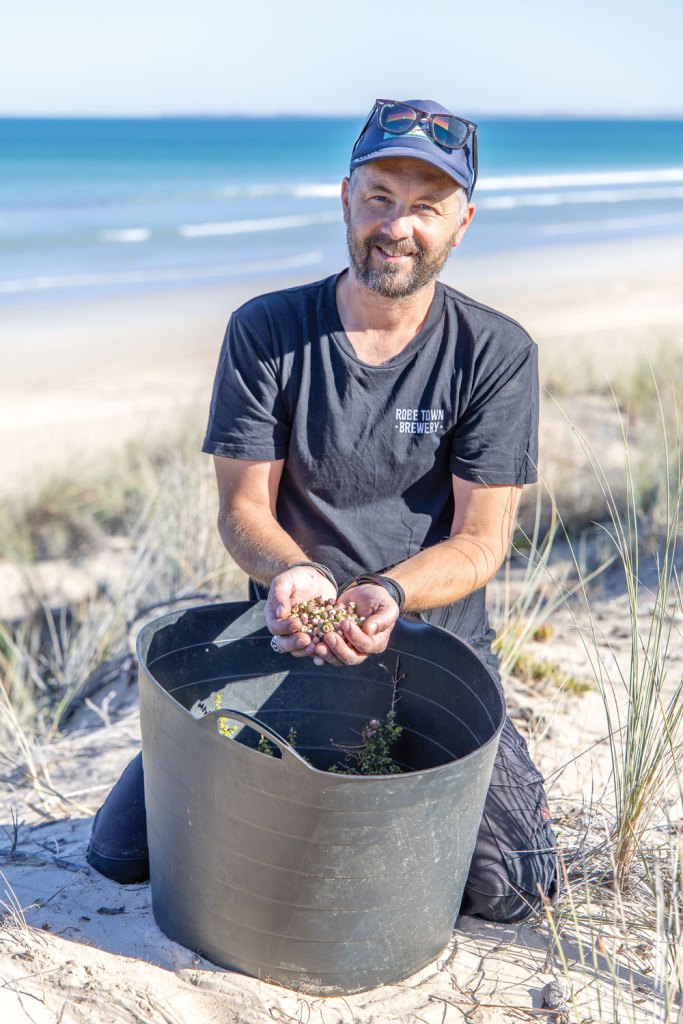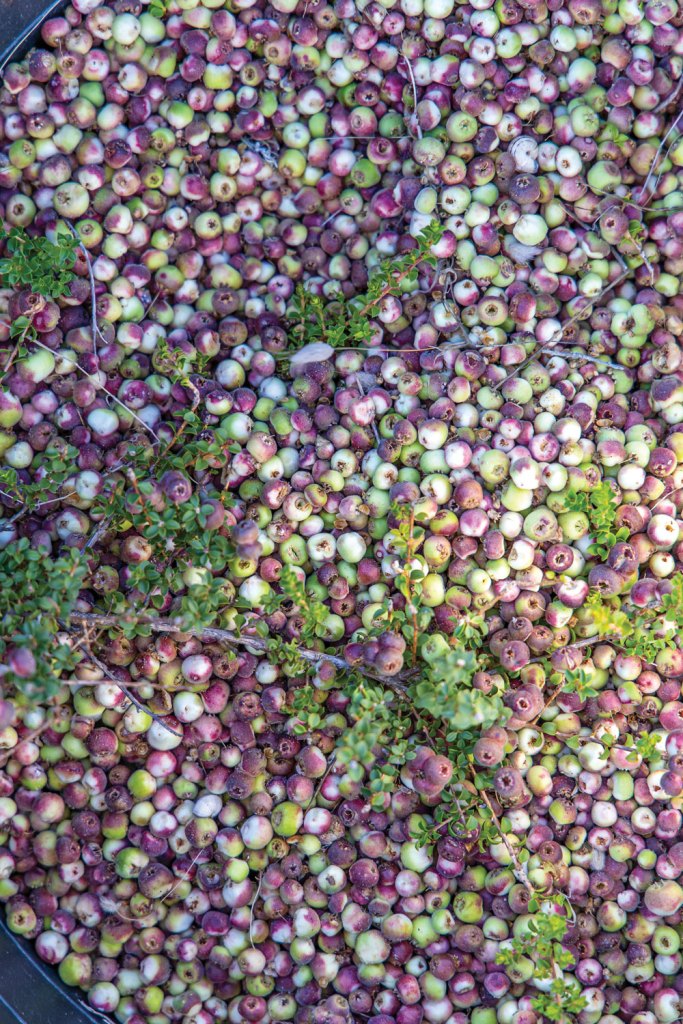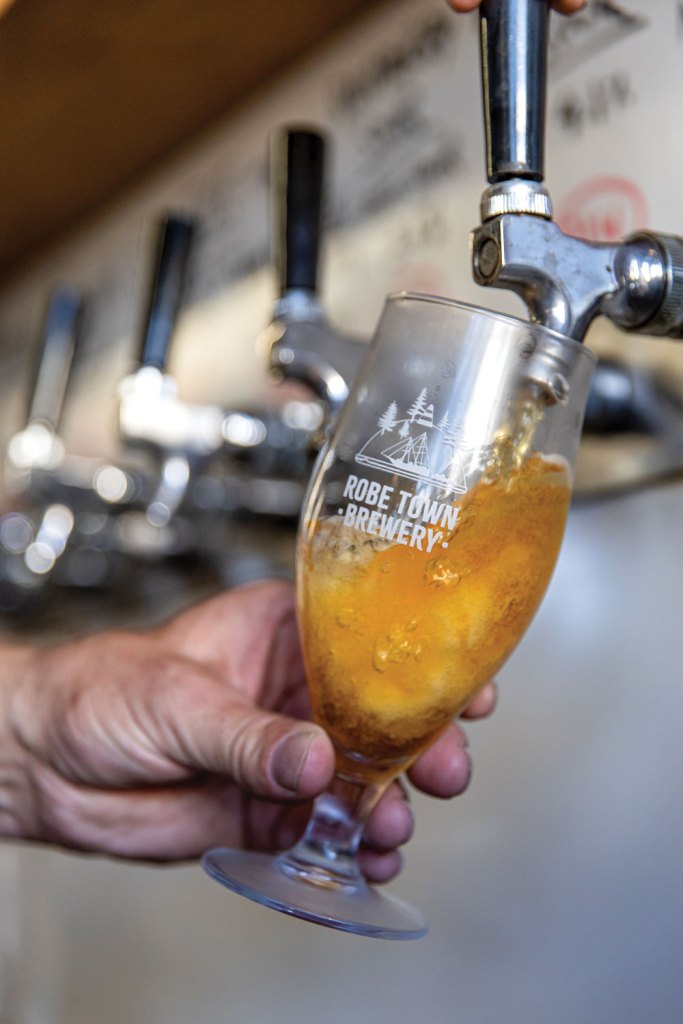From the beach to the brewery
South East brewer Maris Biezaitis combines hand-foraged indigenous bush tucker with ancient, low-tech brewing methods to create what might be some of the world’s most unique beers.

With its electric blue waters, summer sun and large sand dunes, Robe’s Long Beach is about as far as you can get from winter in Europe, but – as SALIFE is about to find out – the dunes of the South East and the wintry forests of Latvia have a common thread by way of a brewer and his inimitable beers.
Traipsing through the dense scrub high in the dunes above Long Beach is where SALIFE finds Maris Biezaitis, the founder of Robe Town Brewery. On this sunny morning, Maris and two of his staff are out foraging for muntries – aka emu apples or native cranberries – that form a key ingredient in one of Maris’s brews: a sour beer called The Little Wild Muntrie.
“The muntrie is an old Indigenous bush-tucker food, a superfood in a way, with more vitamin C than in oranges. They’re quite prolific in the dunes here. If you see any berries, I urge you to pick them and eat them,” he says.
Once you know what to look for, it’s easy to find muntrie bushes laden with berries. The blueberry-sized fruits are surprisingly tasty – sweet and tart with a hint of apple. Maris’s crew picks for two hours to fill one 20-litre bucket. They’ll come back again a few more times, needing about 60 litres of muntries to make a batch of beer.
“It’s not a big batch, but enough to last us most of the year,” says Maris.

Muntries are not the only prize among the dunes. We stop to sample the fruit of the native succulent pigface, which tastes sweet and a little fig-like. Maris uses pigface in another beer, too. We also find the coastal currant, which Maris says is not quite suited for beer, but is surprisingly tasty for something that grows out of the sand.
You might like
Maris’s interest in foraging goes right back to his youth. He was born in Adelaide but at age 12 moved with his family back to Latvia – the country his grandparents fled as refugees during World War II. Maris’s family moved into a house surrounded by forest. Latvia had only recently become independent from the Soviet Union and life wasn’t easy.
“Often things were scarce, but thankfully the traditions were still strong, and I learned to forage for food in the forest,” Maris says. “In the right season, we could pick blueberries, cranberries and wild strawberries in spring, or mushrooms in autumn. We pickled and preserved food and had a wood-fired stove that I learned to cook on. Living near the forest and spending summers near the rivers and lakes was such a great experience.”
When he eventually moved back to South Australia and settled in Robe with his wife Kristi, the couple became interested in the history of the region and its role as a plentiful food bowl for the Boandik people.
“When Kristi and I were first exploring Robe, we learned that this region was a food basket that would draw the local Indigenous people to migrate here for summer,” he says. “I read that they came for fish and shellfish, muntries, pigface and other berries. We found the muntrie berries and thought they were amazing. We made muntrie jam and pretty soon I thought that a muntrie beer would be pretty interesting – why not?”
After a warm couple of hours picking muntries in the dunes, Maris and his crew take a refreshing dip in the pristine ocean, before it’s time to head to Robe Town Brewery where Maris is installing a new still for making whisky.

Back at the brewery and taphouse – located in a big shed a few blocks from the Robe main street – the full extent of Maris’s unique beer-making methods becomes clear. Unlike most breweries where you’d find flashy stainless-steel vats, refrigerated tanks, tubes and pipes, Robe Town Brewery has old wine barrels and a brick wood-fired stove.
Maris claims to have the only wood-fired brewery in Australia. He uses an ancient technique of using hay filtration inside wine barrels. Further, Robe’s mild climate allows him to use non-refrigerated fermentation, allowing his beer to slowly ferment naturally over several weeks.
Subscribe for updates
“I grew up with a wood stove, and I first started brewing using my wood stove at home. So, when I wanted to start the brewery, I saw there were already hundreds of breweries in Australia, and they were all doing it the same way. I didn’t have the money to buy fancy equipment, so using wood fire was something different that I could build myself,” he says.
“The combination of these old-school methods is unique in the world as far as I’m aware. There are a couple of breweries in the world that use wood fire, but I don’t know any breweries that mash their malt in barrels through straw – and the combination of that with the non-refrigerated fermentation is unique.” Add in the local native ingredients from the sand dunes, and you’ve got a one-of-a-kind.
Maris believes that the times of scarcity growing up as a teenager in Latvia taught him and his family to be self-sufficient. If there was something to fix in the house, you did it yourself. You had to forage and preserve food that wasn’t available at the store. “It taught me courage to give things a go. I think that’s why I had the courage to start my own brewery and build my own equipment, right down to the taproom bar,” he says.

“I like doing things differently – out of the box – and not conforming to what everyone else does. It’s slow brewing in a way; low-tech, environmentally sustainable and personal. An ode to history and the way it used to be done.”
Maris makes more than 25 beers, including the Little Wild Muntrie. To create this sour beer, he first adds lactobacillus bacteria to the mash, which starts turning the sugar into lactic acid, making it sour. The mix is boiled, chilled and then mixed with the muntries. This berry-beer mix is left to ferment for two months, before being bottled and kegged where it naturally carbonates.
While the sourness of the Little Wild Muntrie is not for everyone, there is a wide range to suit every taste, from porter to amber, IPA, pale ales and everything in-between.
Then there’s the Holy Smokes camel dung smoked porter, for which Maris uses dried camel dung from a nearby camel farm as fuel to smoke the grains. There’s absolutely no dung in the beer, Maris assures us.
“Making 25 different beers keeps me busy, but it’s fun. There are beers which started as experiments and have gone on to become staples that we have on-tap all the time. I’m still always learning. I’m not a master and I know I’ll be learning all my life.”
This article first appeared in the August 2025 issue of SALIFE magazine.

